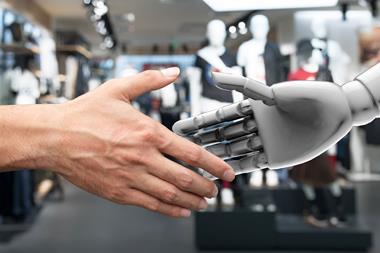As collaboration between human workers and intelligent technology ramps up, Cognizant explores how retailers can reimagine their operations in 2020.
Successful retailers are already modernising their work environments, extracting more value from their data, deepening their understanding of customers, innovating faster and migrating their operations to the cloud – all to become more competitive.
While some retailers are focused on improving their existing operations processes, this is not enough.
Real value creation and cost reduction comes when retailers reimagine the operations process entirely and take a digital-first strategy, rather than making incremental changes to existing models.
This is where artificial intelligence (AI) has a crucial role to play.
Embedding AI into retail operations
Cognizant’s research indicates that the revenue impact of new technologies, including AI, is $634bn (£483bn) globally.
AI helps retailers re-engineer and re-evaluate their end-to-end processes, and real-world applications of the technology can already be seen across the retail industry.
For instance, Retail Week’s 2019 AI in Action report – which interviewed 75 retail leaders on their investment plans – found that AI is being used by brands across logistics, resourcing, recruitment, purchasing, roll-out planning and more.
The managing director of a DIY specialist reported that they were planning to funnel between £3m and £5m over the next 12 to 36 months in departments such as operations.
“The revenue impact of new technologies, including AI, is $634bn globally”
”I think it’s potentially the biggest area of investment for us across the next five years. Using modern ways of analysing data, sending out data and measuring performance will be very helpful to us,” the managing director commented.
In fashion, emerging retailer Stitch Fix is making use of AI to enhance the service its stylists deliver to clients.
Stitch Fix’s algorithms analyse the latest style trends in combination with customer measurements, body type, budget, preferences and feedback to distil possible garment selections.
This drastically reduces the time spent on individual clothing suggestions and provides recommendations to clients that closely match their lifestyle and budgets.
Major brands are also clamouring to incorporate AI into their operations to drive agility, speed and productivity.
However, it’s important that retailers don’t think of AI as a superpower in and of itself – it’s essential to view these intelligent systems as going hand-in-hand with human work.
Unilever, for example, is incorporating AI and machine learning into its supply chain through human and machine collaboration. It is building virtual versions of its factories to track physical conditions and enable testing of operational changes.
In what is referred to as its ‘digital twin’ strategy, the consumer goods giant is using AI to analyse information from connected devices with the end-goal of making its production more efficient and flexible.
For instance, instead of its production line operators having to stop production to check quality, they can use the ‘virtual twin’ to review whether the process is hitting the right parameters as set out by the algorithm and test the quality offline – only intervening if production is going off track.
Unilever has reported that the strategy has enabled it to save $2.8m (£2.1m) due to reduced energy use and an increase in productivity by 1% to 3%.
Collaboration between humans and machines in retail
AI must be complemented by human workers and their capabilities, which include empathy, critical thinking, creativity, strategy, technological management and imagination.
“It’s important that retailers don’t think of AI as a superpower in and of itself”
When it comes to the most effective relationship between humans and AI, Cognizant’s new whitepaper has identified the following three areas of focus for retailers:
- The job of identifying where to embed AI into the workplace is a new discipline for global retail leaders. In 2020, retailers need to think beyond the purely technological factors required and address changes across the organisational and cultural realms.
- Job roles need to be considered as a collection of tasks that are shared by human workers and AI systems. Cognizant’s research has led to them devoloping a “task master model”; this can help retailers view jobs as a collection of individual tasks with varying levels of relevance for AI versus human work, and optimise the capabilities of both.
- HR will be a key player. HR will need to help leaders navigate the shift to an augmented workforce, as well as assess its own transition to AI-human symbiosis. Certain job roles in the HR department will disappear, some will be enhanced, core functions will remain and new ones will emerge.
This is the beginning of a new era for retailers. Those businesses that plan for AI-augmented operations – i.e. Operations 2.0 – will be most likely to maximise value.
Cognizant helps retailers adopt a digital-first strategy by combining digitisation, machine learning and AI to automate end-to-end operational processes and deliver transformational efficiency gains.
Retailers can learn how to reimagine their operations with an AI-powered digital-first strategy by downloading Cognizant’s free whitepaper The Symbiosis of Humans and Machines.





























